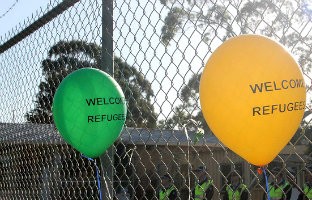Children at the door

Since October, 57,000 children from El Salvador, Guatemala, and Honduras have been taken into custody as they crossed illegally from Mexico into the United States. This is ten times the number that crossed in 2009. Most analysts say these children are fleeing growing rates of violent crime in northern Central America, a place where brutal gangs undermine the rule of law and drug traffickers forcibly conscript youth as foot soldiers.
The United Nations High Commissioner for Refugees has called for the United States to approach these vulnerable young people with the assumption that they are refugees, not criminals—to focus on protecting them from danger rather than on protecting Americans from them. The U.S. Catholic bishops and others agree. These children’s lives have dignity, and their homelands threaten it. Simply sending them home isn’t an option.
The Obama administration isn’t so sure. “Do not send your children to the borders,” the president said in June, addressing Central American parents. “If they do make it, they’ll get sent back.” Obama has asked Congress to allow the Department of Homeland Security some leeway in applying a 2008 law that prevents unaccompanied minors from nonadjacent countries from being summarily deported, requiring instead that they stay until they get a proper hearing. Some believe that the law, designed to protect trafficking victims, is now motivating Central American families to send their children north. DHS wants to utilize “voluntary removal”—a process in which minors are subjected to an often confusing and intimidating interview aimed at getting them to agree to their own deportation.





